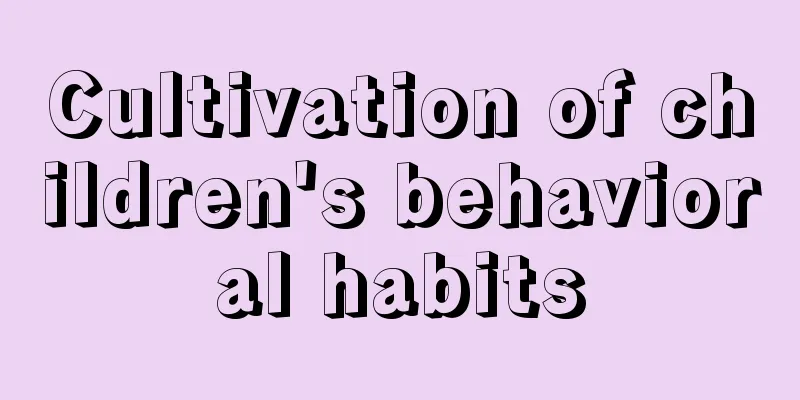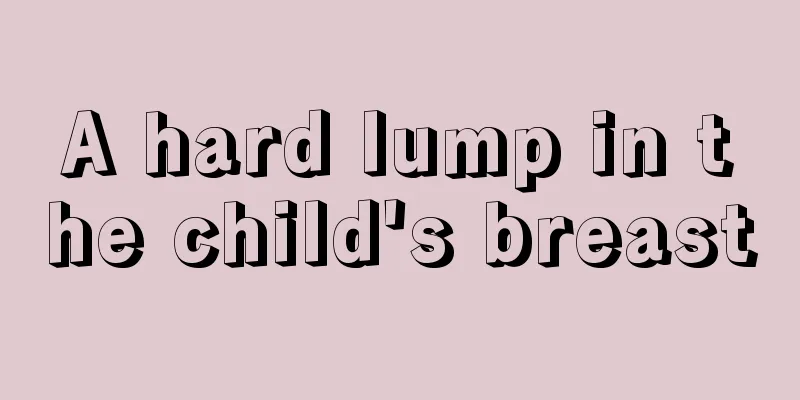Cultivation of children's behavioral habits

|
We all know that early childhood is the initial stage of life. Children need to learn everything, and they learn very quickly. Therefore, it is critical and important to teach children to develop good behavioral habits. I wonder if you know any methods of cultivating behavioral habits for young children? I believe this is also a question that many parents want to know, so let us take a detailed look at it below.
What are the methods to cultivate children's behavioral habits? The cultivation of children's behavioral habits is very important, so parents must pay more attention to it and help their children develop good habits from an early age. This will help their growth and parents will not have any regrets. Young children are at the initial stage of their life. They have everything to learn, are highly malleable, and have poor self-control. This is both a critical period for developing good behavioral habits and a dangerous stage for acquiring bad behavioral habits. If good behavioral habits are not cultivated in a timely manner, they will miss the opportunity and develop bad behavioral habits. But old habits die hard and once they become second nature, they will cause irreparable damage to future development. As the famous educator Mr. Ye Shengtao said: "What is education? In a simple sentence, it is to develop good habits." What good habits should be cultivated in young children? Mr. Ye Shengtao pointed out: "Education in our socialist society is to cultivate all good habits for students to live in socialist society. In moral education, we must develop good habits in dealing with people and working; in intellectual education, we must develop good habits of seeking knowledge and familiarizing ourselves with skills." Specifically, there are moral behavior habits, labor habits, living habits, hygiene habits, learning habits, social habits, etc. In view of the developmental characteristics of young children, they should never leave food, dress and undress by themselves, not spit or urinate anywhere, put used things back in their original place, go to bed on time, and get up on time. Having good living habits lays the foundation for forming good moral habits, work habits, hygiene habits, etc. 1. Be patient and encouraging, and make clear and strict demands on young children. When making each request, we carefully consider it in advance to ensure that the request is reasonable. According to the abilities of the children, the requirements are gradually increased step by step. At the beginning, I just want the children to master simple rules of life. For example, when in class, you should sit quietly and not disturb others. Next, requirements regarding social behavior are put forward, such as being polite to others, saying hello to teachers and aunties when seeing them, accepting gifts from others, or saying thank you when receiving help from others, etc. From the perspective of young children's abilities, fulfilling some extremely simple requirements requires tremendous effort. If the teachers' demands on them are unreasonable and they cannot accept them, then such demands will be in vain. When young children are unable to meet some of the teacher's requirements, they often lose confidence in their abilities, doubt what the teacher says, and stop trusting the teacher. When I make requests to the children, I pay attention to making the content specific, clear, the language popular and concise, and suitable for the age characteristics of the children. For example, require young children to be polite to others. I tell the children: say hello to the teachers and other children when entering the kindergarten in the morning; say "goodbye" when going home; concentrate when talking to others and don't interrupt others when they are talking; and ask the children to pay attention to hygiene. I say, we should be hygienic children, not spit anywhere; don't urinate or defecate anywhere; ask the children to fold the clothes and pants they take off during nap and put them in a fixed place... Such requirements are specific and clear, so the children can follow them. 4 children in a family with 4 children 2. Continue to encourage and allow children to gradually develop good behavioral habits during practice. Young children’s willpower is not strong enough to sustain and it is difficult for them to concentrate for long periods of time. Based on this characteristic of young children, I adopt the method of constant encouragement to correct their bad behavior. For example, when everyone is taking a nap, some children often get up to urinate and walk with heavy steps. We will give them a hint and remind them to correct it. When the children walk carefully, we will smile and nod to show that they are doing the right thing. For example, there is a new kid in our class named Wei Xiaolei. He is very timid. He is not used to collective life, does not believe in his own strength, and often dares not to do even the simplest things. For him, we need to cultivate the habit of being sociable. I used various methods to encourage him. Let him do some simple things first. For example, during art class, let him distribute art paper; during lunch, let him distribute chopsticks. After one or two exercises. His courage gradually grew. Next, I trained him to speak in public. Once when we were learning the nursery rhyme "Teacher's Hands", I asked the children in the class: "What can the teacher's hands do?" This is a very simple question. After asking the question, I consciously said: "The teacher is going to ask a brave child to answer this question. Let's see who has been braver recently than in the past?" The children mentioned Wei Xiaolei at the same time, so he boldly stood up and answered the question. When young children are encouraged, they will consciously stop bad behaviors in order to get pleasure from their own behavior. 3. Pay attention to correcting any minor behavioral mistakes of young children Young children often develop bad behavioral habits slowly from small mistakes. These things often happen in daily life: some children are prone to temper tantrums, lying on the ground and stomping on the floor with their little feet, crying and shouting; some children like to play with certain toys and want others to give them to them unconditionally... We should not take a tolerant attitude towards these behaviors and allow them to develop. When children first enter the kindergarten, their habits are poor. They are not focused when eating, look around, and eat very slowly. In addition, as they grow older, the need for communication between children continues to increase, and the phenomenon of talking while eating also increases. The teacher's reminder is not a good way to solve the problem. Only by mobilizing the children's internal factors and stimulating their ambition can the children change from passive to active and consciously abide by the discipline. Thus, the "Best Dining Table" was created in our class. How can we become the "Best Dining Table"? After discussion, we listed the standards, namely eating seriously, not talking, eating quickly, and not being picky. After being evaluated, each of them will receive a small red flower. The teacher also makes requirements for all the children in the class. Those who have made great progress can be awarded the title of "Best Table". If more people make progress, we can also set up two "Best Tables". Now, teachers no longer need to remind them as before. Bad habits such as talking while eating, not paying attention, looking around, and eating slowly have been reduced a lot. Eating is no longer a problem for children. 4. Cultivate good behavioral habits of children through game activities Games are the dominant activities for young children. During games, children are in a good mood, have active thinking and strong receptive ability. Through the process of game activities, young children can learn how to properly handle interpersonal relationships and are more likely to develop some good qualities. At the same time, some bad behavioral habits are also easy to manifest, which helps teachers to discover and correct them in time. For example, once, I organized the children to play the "Food Store" game. At the beginning of the game, Li Lin and Zhang Bo suddenly started arguing. I walked over and asked, and it turned out that they were fighting over a new gas stove. Neither of them wanted the old one. What should they do? There was only one new gas stove. I thought for a while, then picked up the old gas stove and put it on my ear. After a while, I said to the two children, "The old gas stove just told me that it can also be used. The children don’t like it. It is so sad. It wants to find a good friend. Who is willing to help it?" After I said this, Li Lin went to get the old gas stove. The two children smiled and said, "Teacher, we won't fight anymore in the future." I affirmed their behavior and used it to educate the children to be civilized, polite, to be humble to each other and strive to be good children. 5. Teachers should set an example for children Young children have strong plasticity and imitation ability. The most direct object of their imitation is the teacher. They observe the teacher's words and deeds most carefully, have the strongest feelings, and imitate the teacher's words and deeds without selection. For young children, the teacher’s words can be said to be the “highest instructions”, and children can often be heard defending their own words and actions: “The teacher said this…” This puts higher demands on the teacher’s words and actions. Therefore, we pay attention to starting from ourselves and being strict with ourselves. Whatever we ask the children to do, we do it first. Whatever we don’t allow the children to do, we must not violate it. Once we violate it, we must have the courage to admit our mistakes in front of the children. I remember one time after class, I accidentally walked into the classroom and saw two children sitting at the table talking. I criticized them on the spot. Later, one of the children whispered, "The teacher sometimes also sits on the table and talks." His words surprised me. When I thought about it carefully, I realized that I had indeed experienced such a phenomenon. I said to the child, "Really? Why didn't you point out this bad habit to me earlier? From now on, let's supervise each other and not let bad habits appear again, okay?" As the ancients said, "Precepts are not as good as actions. If a person's conduct is upright, he will do the right thing without being told; if a person's conduct is not upright, he will not do the right thing despite being told." Therefore, teachers should regulate their own words and deeds and set an example for young children. 6. Cooperate between home and school to jointly promote the formation of good habits among young children. In recent years, families have paid more and more attention to early childhood education. This trend is very encouraging. However, many parents who want their children to be successful only focus on developing their children's intelligence but pay little attention to cultivating their children's early behavioral habits. This requires families and kindergartens to put the cultivation of children's good behavioral habits first. Therefore, for some parents who only focus on learning knowledge, I gave them a multiple-choice question: A. Teach your child to write 10 words a day. B. Help children get rid of a bad habit in 10 days and let them develop good behavioral habits from an early age. Most parents would choose the latter with a smile. Regarding the cultivation of children's behavioral habits, parents need to pay attention to the aspects mentioned above. By mastering the knowledge in these aspects, parents will be able to help children develop good habits. I hope parents can implement strict requirements in their children’s lives and let their children develop good life routines and habits from an early age. |
<<: What to do if your child refuses to take a bottle
>>: The difference between diapers and disposable diapers
Recommend
How should tooth decay in a two-year-old baby be treated?
Many children will have the problem of biting the...
Are there risks in extracting baby teeth?
Primary teeth are the teeth that appear in childr...
Symptoms of indigestion and fever in children
Once the season when diseases are prevalent arriv...
Pityriasis capitis in children
Children's scalps sweat easily, so they may s...
What to do if your child has a fever and sweats
The normal body temperature of a child does not e...
What are the symptoms of a two and a half month old baby getting angry?
Many new mothers do not know much about the daily...
What should I do if my child has yellow water discharge from his ears?
I don’t know if your children have ever experienc...
Prevention and care of baby's cough, sneezing and runny nose
In fact, babies have relatively low immunity, so ...
What should I do if my baby's ears are leaking yellow water?
Having a child is a very happy thing, and as pare...
What should I do if my one and a half year old baby has a runny nose all the time?
Runny nose is a very common phenomenon. Adults wi...
What are the physical cooling methods for children?
As children grow up, many diseases can cause them...
Newborn choking on milk
In our lives, newborns are particularly prone to ...
What to do if your child has chickenpox and a fever
When a child gets chickenpox, parents must take g...
Why do three-month-old babies always stretch hard?
Babies need to slowly adapt to life right after t...
What medicine is better for children with indigestion?
Children's gastrointestinal systems are not a...









